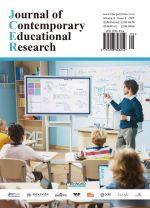Research on the Approaches of Integrating Curriculum Ideology and Politics into Middle School Biology
Abstract
With the development of social economy, the subjects, methods, and contents of ideological and political education have undergone changes. It is not only necessary to give full play to the role of ideological and political courses but also to focus on exploring teaching forms and methods to promote the realization of the goal of “fostering virtue through education”. Under the background of the new curriculum reform, in middle school biology teaching, it is necessary to implement “fostering virtue through education”, carry out ideological and political education, effectively improve the effect of talent training, and promote the development of students’ values. From the perspective of middle school biology, this paper discusses the necessity of integrating curriculum ideology and politics, analyzes the principles that should be followed in the infiltration of ideological and political elements, and puts forward specific strategies for biology teaching practice, aiming to cultivate students’ good values and lay a solid foundation for their subsequent knowledge learning.
References
Bandura A, 2013, Self-Efficacy: The Foundation of Agency. In Control of Human Behavior, Mental Processes, and Consciousness, Psychology Press, 16–30.
Ellis R, Yuan F, 2003, The Effects of Pre-Task Planning and On-Line Planning on Fluency, Complexity and Accuracy in L2 Monologic Oral Production. Applied Linguistics, 24(1): 1–27.
Jiang Z, 2016, A Study on the Cultivation of Critical Thinking in English Majors Through Collaborative Teaching from the Perspective of Scaffolding Theory: Taking Basic English Teaching as an Example. Journal of Heihe University, 7(07): 105–106.
Li H, 2009, Analysis of the Current Situation of University Students’ Language Expression Ability and Strategies. Higher Education Development and Evaluation, 25(6): 100–104.
Nunan D, 2004, Task-Based Language Teaching. Cambridge University Press.
Sayare Y, 2011, Discussion on Cultural Differences in University Teaching in Multi-Ethnic Regions: Taking Universities in Xinjiang as an Example. Heilongjiang National Series, 2011(4): 4.
Skehan P, 1998, Task-Based Instruction. Annual Review of Applied Linguistics, 18: 268–286.
Su Y, 2014, Cultivating Students’ Creative Thinking in College English Class Based on Task-Based Teaching Method: Comment on Task-Based Language Teaching. Contemporary Educational Science, 2014(21): 1.
Wang J, 2018, Exploration of Flipped Classroom Design Strategies Guided by Scaffolding Theory. Teaching Research, 41(03): 81–87.
Willis J, 1996, A Flexible Framework for Task-Based Learning. Challenge and Change in Language Teaching, 52: 62.
Xu H, 2009, Cultivation of Cross-Cultural Communication Ability in College English Teaching. China Adult Education, 2009(12): 2.
Zhang L, Zhou Y, 2009, The Significance of Oral Communication Teaching in the Context of Contemporary Culture. Charming China, 2009(28): 1.

